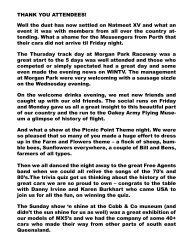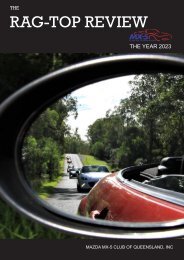CosBeauty Magazine #85
CosBeauty is the #BeautyAddict's guide to lifestyle, health and beauty in Australia. In this issue: - The Breast Report - your guide to augmentation - Put an end to bad hair days - 24 hour makeup, products that last - Sex appeal - do you have it?
CosBeauty is the #BeautyAddict's guide to lifestyle, health and beauty in Australia.
In this issue:
- The Breast Report - your guide to augmentation
- Put an end to bad hair days
- 24 hour makeup, products that last
- Sex appeal - do you have it?
Create successful ePaper yourself
Turn your PDF publications into a flip-book with our unique Google optimized e-Paper software.
feature<br />
that set people on the path of quitting<br />
sugar. From being 40kg overweight,<br />
he immediately started losing weight,<br />
and kept it off, by cutting sugar<br />
(specifically fructose) from his diet.<br />
He claims sugar is addictive – a fact<br />
exploited by food manufacturers –<br />
and a rare resource to which we don’t<br />
have an in-built ‘off switch’, meaning<br />
we can keep eating it without feeling<br />
full, leading to weight gain and a<br />
myriad of health effects.<br />
One study by Nicole Avena,<br />
Pedro Rada and Bartley Hoebel<br />
(2008) looked into the addictive<br />
properties of sugar. It examined the<br />
physiological response to sugar intake<br />
in rats, and how the rats behaved<br />
when ‘on’ and ‘off’ sugar.<br />
‘Food addiction seems plausible<br />
because brain pathways that evolved<br />
to respond to natural rewards are also<br />
activated by addictive drugs,’ the<br />
report states. ‘Sugar is noteworthy as<br />
a substance that releases opioids and<br />
dopamine and thus might be expected<br />
to have addictive potential.’<br />
After a month ‘on’ sugar, the<br />
animals showed a series of behaviours<br />
similar to the signs of drug abuse.<br />
‘These are categorised as ‘bingeing’,<br />
meaning unusually large bouts of<br />
intake, opiate-like ‘withdrawal’<br />
indicated by signs of anxiety and<br />
behavioural depression and ‘craving’<br />
measured during sugar abstinence as<br />
enhanced responding for sugar.’<br />
Is it really<br />
that bad?<br />
Sugar has been linked to high<br />
blood sugar, cardiovascular<br />
disease mortality, diabetes and<br />
cellular ageing.<br />
An article published in the<br />
online journal Open Heart<br />
found sugars are probably more<br />
instrumental in increasing the<br />
risk of hypertension (high blood<br />
pressure) and cardiovascular<br />
disease (CVD), as compared to<br />
dietary sodium (salt).<br />
‘Compelling evidence from basic<br />
science, population studies, and<br />
clinical trials implicate sugars, and<br />
particularly the monosaccharide<br />
fructose, as playing a major role in<br />
the development of hypertension,’<br />
the researchers state. ‘Moreover,<br />
evidence suggests that sugars in<br />
general and fructose in particular<br />
may contribute to overall<br />
cardiovascular risk through a<br />
variety of mechanisms.’<br />
Furthermore, a study published<br />
in the JAMA Internal Medicine<br />
journal, conducted by researchers<br />
at the Division for Heart Disease<br />
and Stroke Prevention at the<br />
Centers for Disease Control<br />
and Prevention, associated a<br />
high added sugar intake with a<br />
heightened risk of CVD.<br />
The study found that people<br />
who consumed between 17 and 21<br />
per cent of their daily calories from<br />
added sugar exhibited a 38 percent<br />
higher risk of CVD mortality,<br />
compared to those whose added<br />
sugar intake was maintained at<br />
around eight percent. For those<br />
whose daily intake of added sugar<br />
was more than 21 percent of their<br />
daily calories, they had double<br />
the risk of CVD mortality. And,<br />
in participants who consumed 25<br />
percent of their daily calories from<br />
added sugar, their risk of CVD<br />
mortality was tripled.<br />
Cellular ageing<br />
The anti-ageing world is full of<br />
talk about telomeres – or the<br />
protective DNA that caps the end<br />
of cell chromosomes. The common<br />
consensus is the longer the telomeres,<br />
the longer the quality of life. The<br />
trick? Telomeres continuously shorten<br />
as our cells replicate, getting shorter<br />
and shorter as we age.<br />
Ongoing research is furiously<br />
exploring the possibilities in<br />
lengthening telomeres to reduce the<br />
rate of ageing or ways to prevent<br />
their ever-persistent shortening. But<br />
sugar, according to scientists from<br />
the University of California-San<br />
Francisco, is one sure-fire way to<br />
shorten your telomeres before their<br />
time. The research, led by Prof. Elissa<br />
Epel, assessed 5,309 participants<br />
and found those who drank larger<br />
amounts of sugary soda tended to<br />
have shorter telomeres in their white<br />
blood cells, making them susceptible<br />
to inflammation and chronic disease.<br />
‘Regular consumption of sugarsweetened<br />
sodas might influence<br />
disease development,’ says Epel. ‘Not<br />
only by straining the body’s metabolic<br />
control of sugars but also through<br />
accelerated cellular ageing of tissues.’


















